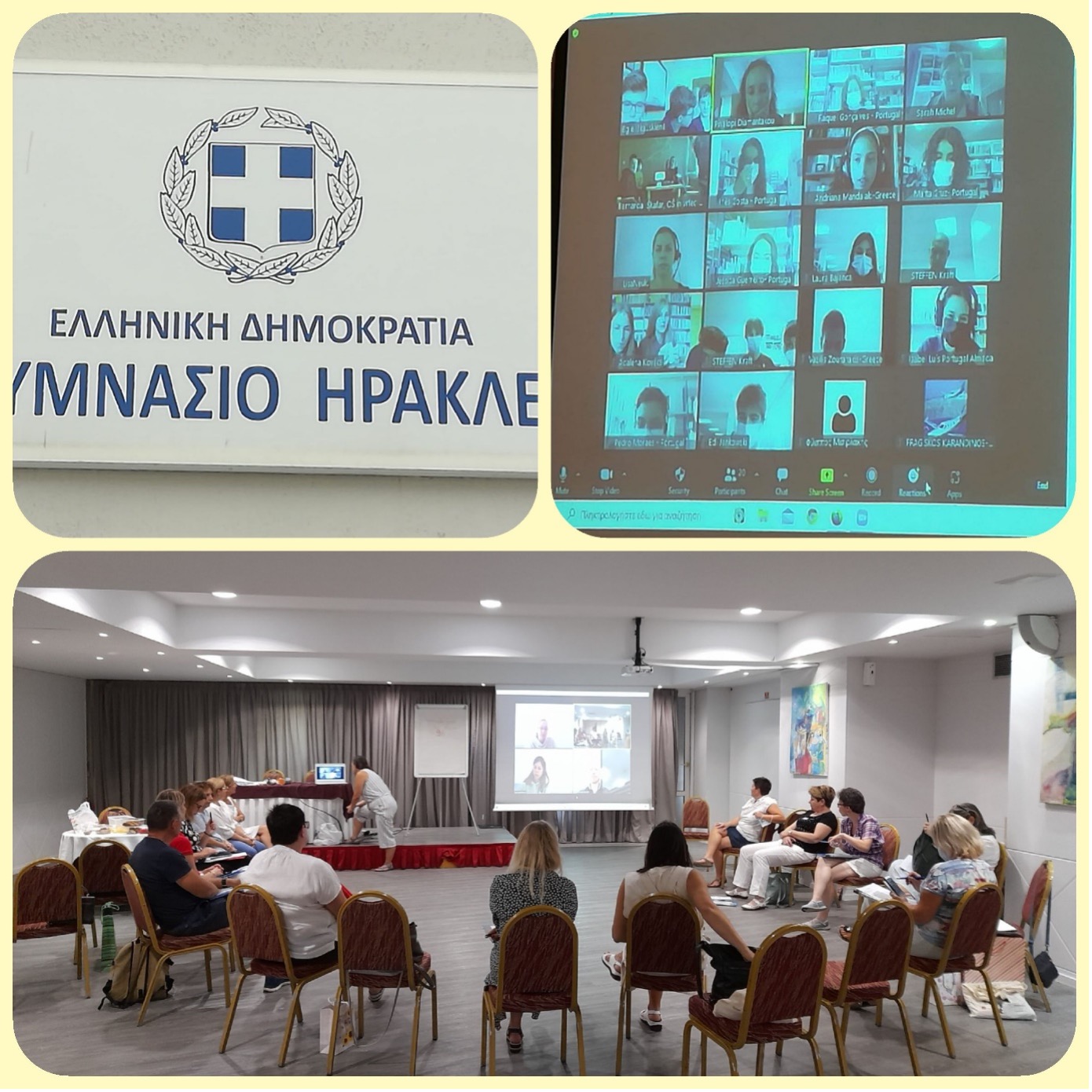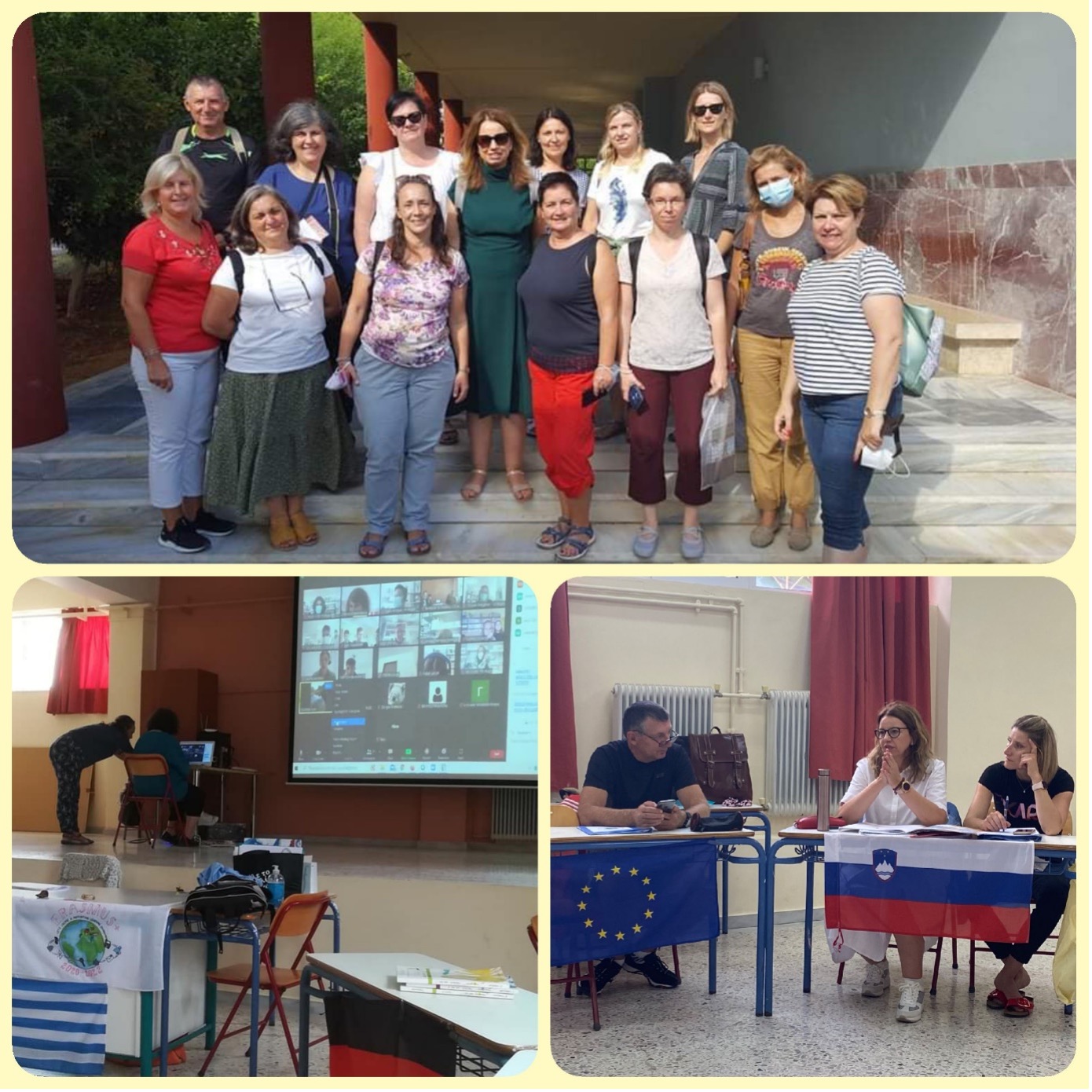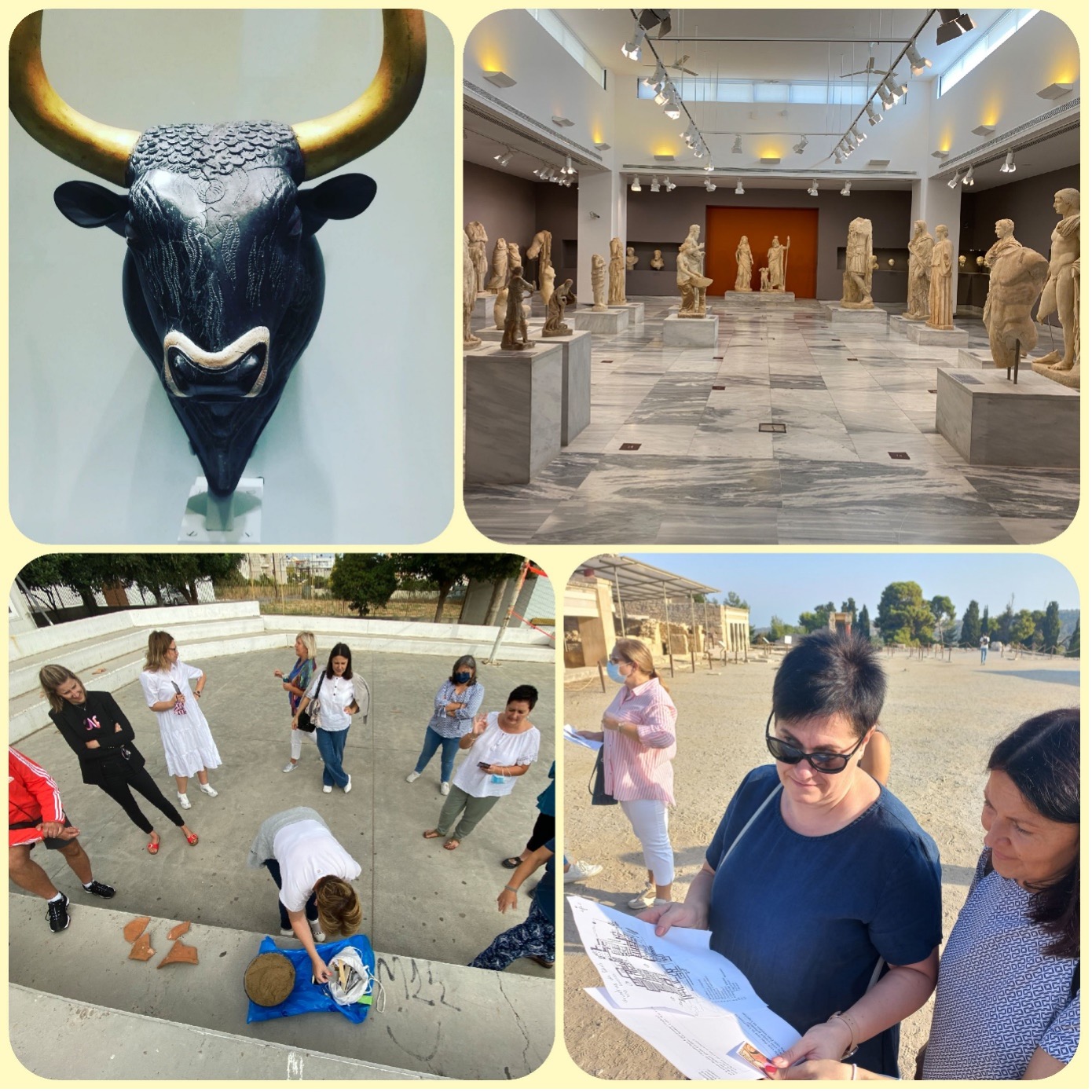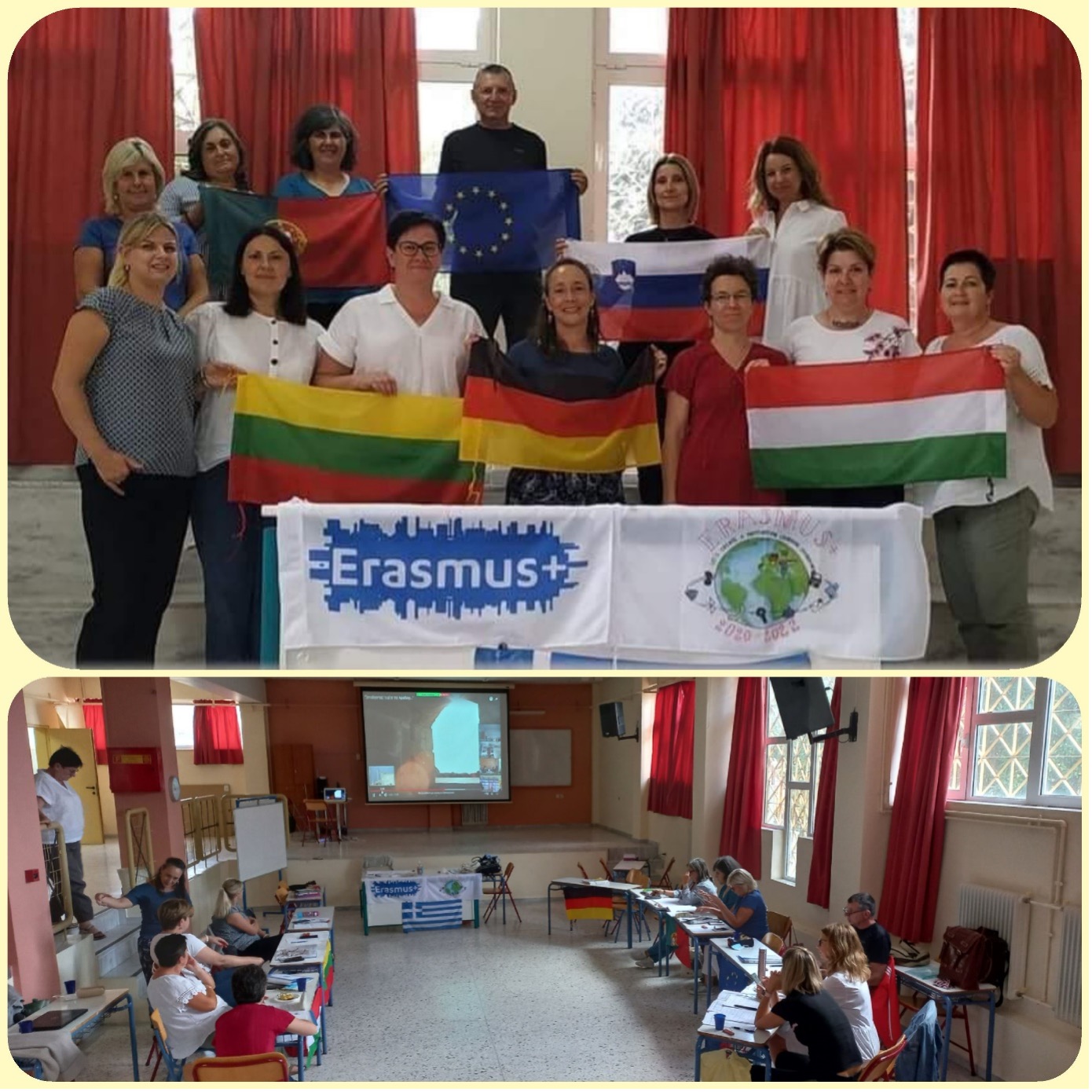The preparations
Already a few weeks before the planned mobility, the teachers exchanged ideas about the project and the contents of the mobility to Greece. Program points were discussed, and activities planned. The planning was complicated by the fact that the pupils from the participating countries were not allowed to travel because of the Covid measures. They were supposed to participate in the activities on two days via video conference. The teachers from Germany were also not allowed to travel. They would participate in the mobility via internet on three days.
The theme of the mobility was "History under the tree - Why not?". The focus was to be on teaching and learning in unconventional learning spaces.
The teachers from the partner countries prepared different presentations on the topic of the project. About how they incorporate unconventional learning spaces in their lessons and what experiences they have had with unusual learning spaces in their lessons. The pupils also had a homework to do. On a common internet noticeboard, they collected suggestions and ideas about how to optimize timetables and they designed "timetables according to pupils' wishes". In international groups, the pupils also exchanged ideas about the topic of the mobility and met each other.
For the online meeting on the mobility days, the pupils prepared presentations. The presentations were about unconventional learning spaces. The students took photos of learning spaces in their school and thought about how these places could be used optimally as a learning space.
Already during the preparation - despite all the Corona restrictions - it became clear that the work of all project participants was very trusting and motivated. The anticipation for the first meeting in Greece was great.
The exchange
In the week from 27 September to 1 October, the time had finally come - the first real meeting of the partner schools of the Erasmus project "Let's Camole" could take place in Heraklion on the Greek island of Crete. The host school, the 7th High School in Heraklion, was able to welcome the teachers from the partner countries Lithuania, Slovenia, Portugal and Hungary. The German teachers who stayed at home were virtually present. The pupils were also involved in the online activities with great joy and enthusiasm.
This was possible because the Greek hosts had prepared the meeting very well and had excellent media equipment. This allowed all participants to spend pleasant and instructive days together and get to know Cretan culture in all its facets.
But also with regard to the project topic "unconventional learning environments", the well-harmonized group of participants was able to work out good results and gain a lot of knowledge.
Day 1: Tuesday, September 28th
Even before the first program points of the project, the nerves of the travelers were tested. On the day of arrival, there was a severe earthquake in Crete. The natural disaster not only unsettled the teacher groups, but it also made changes in the plan necessary. As the school in Heraklion had to remain closed for a few days, the online activities were moved to a hotel. Because of the flexibility and commitment of the Greek organizer, Pinelopi Diamantakou, the project was able to start and run according to plan. The first meeting of the mobility - the German teachers were connected virtually - began with getting to know each other. The focus was on the experiences during the journey and the impressions of the earthquake. Afterwards, the participants got to know Crete and Heraklion better through very interesting presentations and video animations. The participants were given detailed insights into Greek culture and the history of the island. The participants were also introduced to Cretan cuisine and learned the Greek language. This was done through numerous tasks that the teachers had to solve together. Many of the tasks showed how history and culture can be taught in a profitable and varied way.
During the five-hour meeting, there was a lively exchange about the different ways of imparting knowledge. Especially the creation of motivating learning spaces in and outside of school was discussed and the teachers' own experiences were exchanged. How to implement learning in unconventional learning spaces was also discussed. After the lunch break, the participants planned the tour to the palace of Knossos under didactic aspects. The visit to the ancient monument was to take place on Wednesday and should considering aspects of learning in extracurricular places.
At the end of the virtual meeting, the project coordinators discussed the thematic work of the following days and the upcoming mobilities in times of Covid. This first working day in Crete ended with anticipation for the afternoon in Heraklion.

Day 2: Wednesday 29.09
The second day of mobility started with the excursion to the Palace of Knossos. This tour focused on learning at extracurricular learning sites and the participating teams had to complete various learning activities directly in the palace. These included, for example, an exciting search for objects or answering questions about the history of the palace.
After this excursion, the participants met at the school in Heraklion. Here, the next internet meeting with the German project partners took place. On this day, 3-5 pupils from each of the participating countries also participated in the virtual exchange.
At the beginning of this meeting, the participating pupils got to know each other. Pinelopi Diamantakou had prepared games and activities that were a lot of fun for the pupils and made it easier for them to get to know each other. Afterwards, the pupils also got to know many incidents of Cretan and Greek culture. Be it Greek mythology, the timeline of Cretan history or even the quiz games on the Greek language - there was a lively exchange and a lot of fun between the students.
The main theme of the mobility, learning in unconventional places, was also a content of the virtual meeting. Before the mobility, the students from the different countries had already thought about optimal timetables, learning environments at their schools or different learning places. This was a basis for good discussions.
At the end of the second day, the participants were prepared for the upcoming city tour and the visit to the historical museum in Heraklion. This was done through videos and animations. Through the didactic preparation of the material, the participants were able to get an idea of the day ahead. Afterwards, the virtual exchange came to an end. The motivating and joyful cooperation of the group led to many insights that day and the students had very sociable hours. Everyone was already looking forward to the next project day.

Day 3: Thursday 30.09
The third day of mobility was dedicated to Greek culture and history. The teachers in Crete visited the historical museum in Heraklion, as planned on the previous days. There they could admire all the interesting things from the history of Crete. For example, the Minoan rhyton, a part of the "processional fresco" from Knossos or the clay model of a house from Archanes as well as the bee pendants from Malia.
In the context of the theme "Learning in unconventional places", the teachers had to solve tasks in the museum. Through the educational activities, the participants learned how to motivate pupils for learning in a museum. They were also shown different ways to make learning outside school meaningful.
Afterwards, the teachers took part in a very interesting city tour and got to know Heraklion in all its beauty. In the afternoon, the first stop was the port of Heraklion. Afterwards, the participants visited the historic old town and a local market. Before visiting the old town, teams of teachers had been formed. The teams had to complete some tasks and prepare a presentation about learning in out-of-school places. After an interesting day, the participants could explore Crete on their own.

Day 4: Friday 1.10
The last day of the exchange took place at the school. In the school auditorium, the teachers met with the students who were once again virtually connected. Everyone was happy to see each other again.
The working day started with an interesting report by the teachers about the visit to the historical museum. With the help of the video footage and the pictures of the sights, all the participants were able to get an impression of the historical places. The students also had the opportunity to ask questions and were motivated to engage with the museum through various quiz games. Afterwards, there was a discussion about the many possibilities and opportunities that a museum visit offers for pupils and lessons.
After a short break, the teachers presented teaching modules on Greek history and culture. For example, a small performance about the historical gods and artistic tasks. The students were able to learn a lot and it became clear how learning can be made motivating.
Afterwards, the individual teacher groups presented unconventional learning places at their home schools. Before the mobility, each school had named several unconventional learning places and prepared presentations about these places. Now the teachers presented these places and discussed how learning can take place there.
The German partner school could not travel to Crete, so the German team presented the Comenius School in a "live stream". During the virtual tour, the participants could see the different learning spaces of the Comenius School and a conversation about how to use these learning spaces in the classroom started.
After all the teacher groups had finished their presentations, the students became active. In preparation for the virtual meeting, the students had searched for different places in their schools that offered opportunities for unconventional teaching. The students' ideas were, for example, to hold classes in the shade of trees, to use the sports field for group lessons or to network with digital devices on the school grounds. There were many good ideas, and the participants enjoyed the positive and constructive working atmosphere.
At the end of the event, there was an evaluation and discussions about the past days. All participants agreed that these days were very special. The groups have grown together, friendships have developed and there was a profound and motivating exchange. All participants said goodbye with the anticipation of seeing each other again in Portugal.


